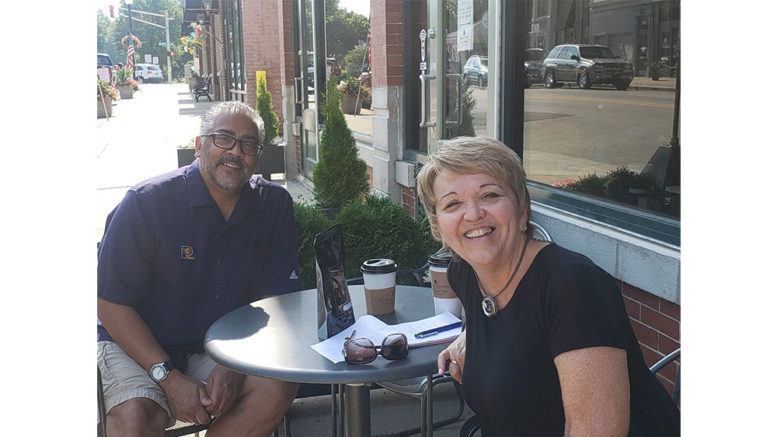From the Heart
 A couple of weeks ago I asked my friend, Bryan Glover, if we could have a conversation about growing up in Noblesville. I had no idea just where this conversation would lead … or how difficult it would be.
A couple of weeks ago I asked my friend, Bryan Glover, if we could have a conversation about growing up in Noblesville. I had no idea just where this conversation would lead … or how difficult it would be.
It was a conversation about race.
We grew up in the 1960s and 70s. He graduated from Noblesville High School in 1975. I graduated in 1974. Bryan is an African American. I am White.
Bryan lived in California most of his adult life. I have never left Noblesville. Bryan returned a few years ago to partner in the family business.
I had never had a conversation like the one we had that overly warm Friday morning at Noble Tea and Coffee. Bryan said he had had this conversation more times than he cares to remember.
We chatted for a bit and then Bryan asked me, “Janet, do you ever think about being White?” It was a question that rattled me, clear to my soul. I answered, “No.” Bryan then said, “I think about my color most everywhere I go.”
It is important for those reading this to know that Bryan’s family has been in Hamilton County since the 1830s. His parents grew upon Noblesville and attended local public schools in the 1930s and 40s. Difficult times.
If you research Jim Crow and the laws you will find that racism had no specific location. Back then, it was everywhere, including Noblesville.
In 1974 and 1975 there were about 800 students in grades 9-12 at Noblesville High School. There were only 10 to 15 Black students.
Bryan remembers being in a music class and singing, “Dixie.” He went to the Diana Theater with his class to see “Gone with the Wind.” There were other school events that make him wonder today if the teachers and school leaders even considered the Black kids and how they might interpret these experiences.
I told him that I never thought about that. The truth is I don’t think anyone who was White ever did. Bryan then said to me, “Thank goodness, today in Noblesville Schools there is a keen awareness of the broad spectrum of students in the classroom.”
It wasn’t until Bryan was an adult that he can remember hearing about the overt racism his parents and their parents encountered in Noblesville. He reasons that his parents didn’t wish to place even more burdens on being a Black kid in this town by talking about the unpleasant part of their past. Instead, his mom and dad readied him and his siblings to stand up for what is right. They knew Mom and Dad will have our backs.
Looking back, Bryan wanted me to know that he often felt invisible in a sea of whiteness. He did not feel comfortable in many situations because bringing too much attention could result in unwanted and unpleasant encounters where racism was likely to be on display. “Just keep it safe and get through another day,” he said.
Bryan remembers quite vividly when and where the “n” word was used in his presence. Time will never heal those wounds.
I told Bryan that I don’t want to see the color of a person’s skin. He jolted my perspective when he told me that he wanted me to see the color of his skin. “Janet, when you see my color you are more likely to understand that my blackness might offer a perspective different from your white perspective. That’s how we can begin to undo systemic racism and other ‘isms’ that exist in everything institutions that underpin most everything we do.”
Whew. This conversation had taken me down a path I had never imagined. It was a hard path but a much-needed path. I began to see clearly what my White privilege meant. I have never had to think about being White except in rare circumstances.
The definition of empathy is “the action of understanding, being aware of, being sensitive to and vicariously experiencing the feelings, thoughts and experiences of another person.”
This conversation led to more conversations in emails and phone calls as I wrote this column over the past two weeks. My fingertips have typed on the keyboard as they also wiped tears. I’ve tossed and turned in bed until I gave up on sleep to revise my column time and time again.
I wanted to get it right. I wanted to make a difference.
Bryan said, “The way I see the time of my youth in Noblesville has changed as I have gotten older. Time and experience has given me a new clarity on experiences from long ago.” Me too, Bryan, me too.
Yet, as Bryan said, “I wouldn’t trade growing up in Noblesville for anything.” Me too, Bryan, me too.
Let the conversations continue. Let’s invite all the voices to the table. Perhaps then there will be a difference made.
Thank you, Bryan, for your time and patience. I’ve learned a lot. My soul has heard your voice.


Thank you for an excellent thoughtful article. I appreciate that Bryan Glover would have this conversation and that you are willing to share your thoughts. It provides me with additional insights regarding the “need to see color”.
Great article. I appreciate hearing Bryan’s perspective especially that white people should notice that he has dark skin and his life experience has been different than mine as a white person.